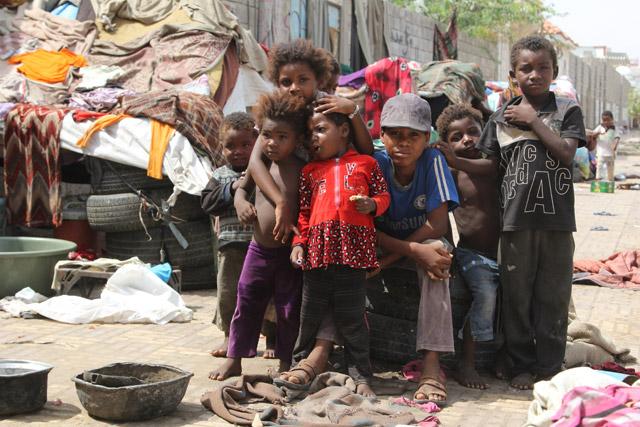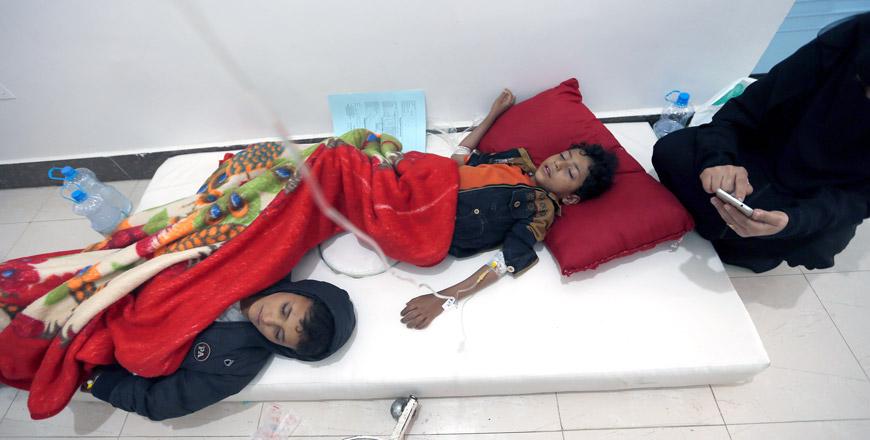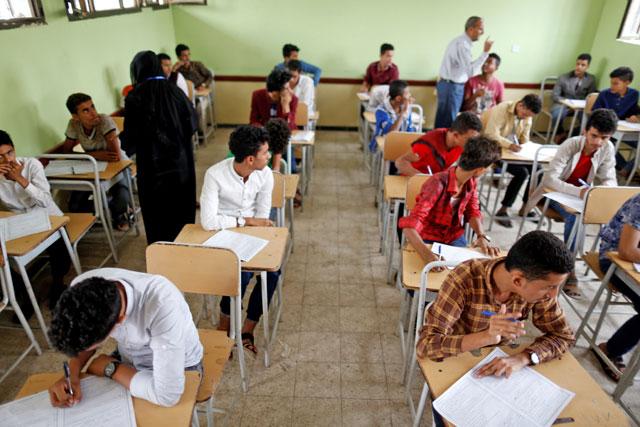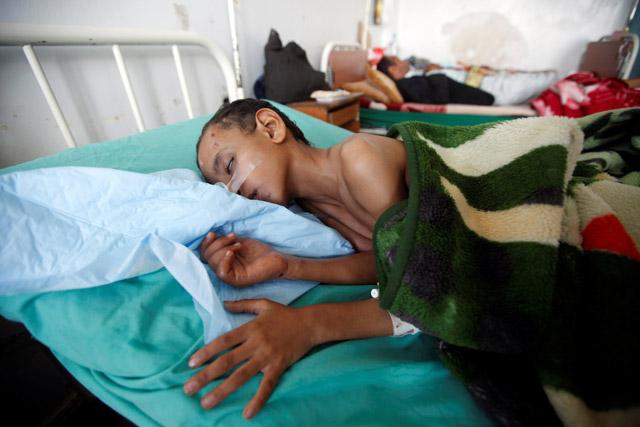You are here
Spread of combat, cholera wreaks misery, collapse in Yemen
By Reuters - May 16,2017 - Last updated at May 16,2017

Children displaced by the war in northwestern Yemen, pose for a photo near their makeshift huts on the pavement of a street in the Red Sea port city of Hodeidah, Yemen, on Monday (Reuters photo)
DUBAI/CAIRO — Spilling into the hallways of crowded Yemeni hospitals, children writhe in pain from cholera. Displaced villagers roam baking hot plains and barren mountains to evade warring militias.
The escalating outbreak of disease and displacement of tens of thousands by recent fighting has inflamed one of the world's worst humanitarian crises, pushing Yemen's war-pummelled society ever nearer to collapse.
Cholera — a diarrhoeal disease spread by food or water tainted with human faeces — has killed 180 people in less than three weeks, according to the Geneva-based International Committee of the Red Cross (ICRC).
Samira Ali, a worried mother, expressed shock at the scene at Sabaeen Hospital in Sanaa, the ancient capital in the north held by the armed Houthi movement since late 2015.
"My young son suddenly started suffering from severe diarrhoea. We went to the hospital and found it full, we couldn't find a place," said Ali, a teacher.
"Only with difficulty were the doctors able to give him the medicines which saved his life. This situation is tragic."
The United Nations now estimates that in Yemen a child under the age of five dies every 10 minutes from preventable causes, two million people have fled fighting near their homes and only half of hospitals have staff and supplies to function normally.
Already one of the poorest countries in the Middle East, Yemen was engulfed in 2015 by civil war pitting the Houthis against the internationally recognised government of President Abed Rabbu Mansour Hadi.
The alliance believes the Houthis, who hold most of Yemen's main population centres, are a proxy for their arch-foe Iran. The Houthis deny this and say they are defending Yemen from domineering neighbours and US hegemony.
The war has been largely stalemated for 18 months since the coalition retook swathes of the south and east. Over 10,000 people in all have died, but the last serious peace talks lapsed almost a year ago.
Hanging by a thread
More than ever before in the war, state institutions are losing their ability to withstand the spread of pestilence and the mounting death toll.
A battle for control of the central bank has left salaries in Houthi-held lands in and around Sanaa largely unpaid for six months, ruining the lives of hospital and sanitation workers.
Pumps to sanitise the water supply sit idle for lack of fuel, while maintenance agencies tasked with chlorinating aquifers go without salaries and supplies.
Doctors treating the cholera outbreak fare little better.
"The health system has been hanging by a thread," UNICEF's spokesman in Yemen, Rajat Madhok, said.
"Wages haven't come in, humanitarian workers and doctors are trying their best but some leave their work to seek jobs where they can get paid. Declining value of the currency hurts and all this has a cascading effect that is badly hurting the sector."
Clutching her young son on Hodeidah's streets, 19-year-old Saleha Ahmed Ali recounted her weary trek down the coast from the northwest. "We're from Haradh, but because of the war we fled to Bajel to be safe there. But when the air strikes got worse in Bajel, we fled to Hodeidah," she said.
"There's no food or milk for our children. We can't even find a mat to sleep on or a bucket to wash our children. They haven't given us tents and it rained yesterday. We don't know where to hide. We've lost our homes. This war has dragged us from place to place."
Speaking to Reuters by phone from Sanaa, Shabia Mantoo of the UN refugee agency UNHCR wondered why the scale of the suffering had not spurred more peacemaking efforts.
"It was already catastrophic, how much worse can it get? Nineteen million people are going through real suffering. Yemen now is an inventory of misery — what more will it take to get the world's attention?"
Diplomats and aid workers fear that if Hodeidah turns into a war zone, up to half a million people could be uprooted, stretching already strained aid groups to breaking point.
Related Articles
SANAA — At least 570 suspected cases of cholera have surfaced in war-torn Yemen in the past three weeks, sparking fears of a potential epide
SANAA — Fighting in a port city in Yemen has forced around 2,000 high school students to flee to the capital to sit exams, braving a six-hou
SANAA — Yemen's cholera outbreak is so widespread that just drinking water can lead to death. Nearly 2,000 people have already succumbe


















